5 things that made us think after Chelsea 1-2 Crystal Palace
FFT's Huw Davies was in the Stamford Bridge press box to analyse another shock defeat for Jose's title holders...
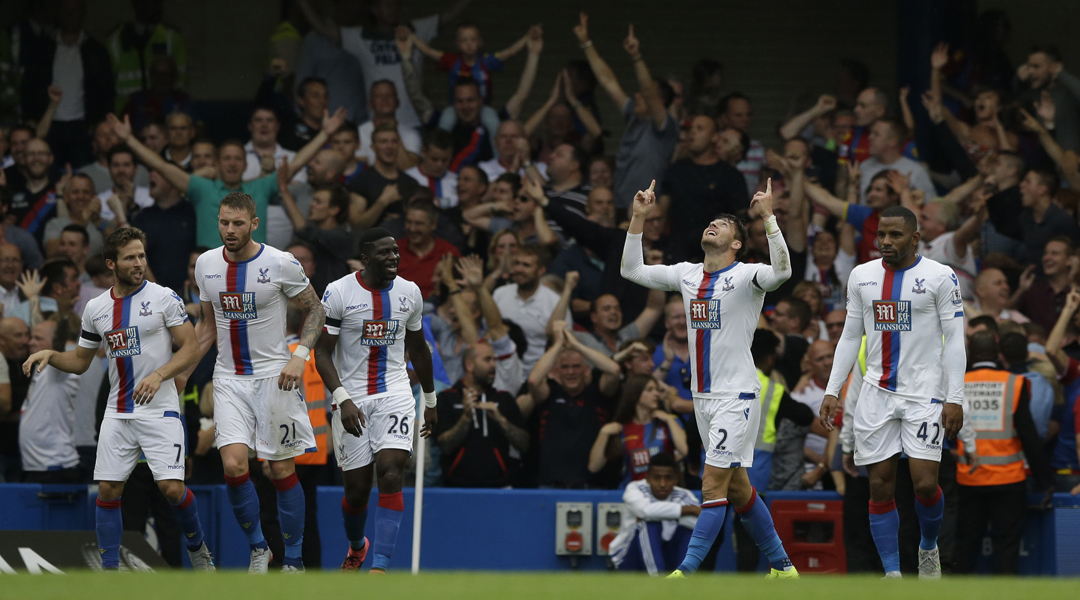
1) Palace are leading rise of counter-(attacking) culture
A characteristically moody post-match Jose Mourinho insisted that in any discussion of this match, Crystal Palace deserved to be mentioned first, ahead of any talk about refereeing decisions or his own team's performance (which he then spoke about at length). "The most important thing," he said, "is Crystal Palace." OK then.
The Eagles landed at Stamford Bridge as statistically the Premier League's best away side in 2015, and their subsequent display showed why that is. A committed, disciplined but nonetheless forward-thinking team performance was down to an efficient shift put in by every player (well, almost every player – we'll come onto that later).
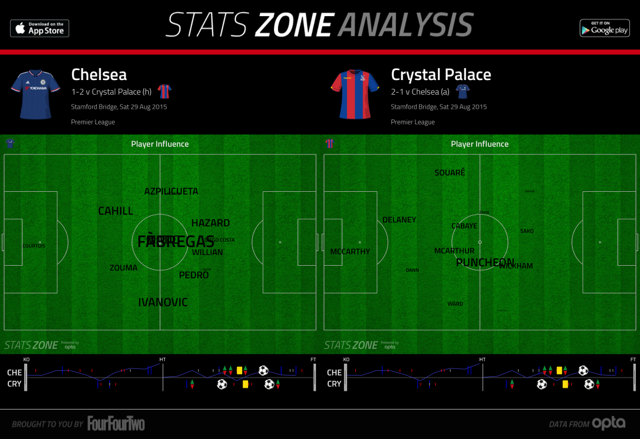
There were long balls, a deep backline and pacy sprints up the pitch to relieve pressure, but in the 80-odd minutes before the match ended with a series of desperate, flying blocks from the visitors, they weren't playing anti-football, or even particularly defensive football; indeed, their midfielders looked threatening on virtually every break.
This was no smash 'n' grab, either: Chelsea may have had more shots, thanks largely to that late flurry, but Palace had the best chance of the first half through Yohan Cabaye (who aimed tamely at Thibaut Courtois), won as many corners and put in as many crosses as their hosts across the whole match.
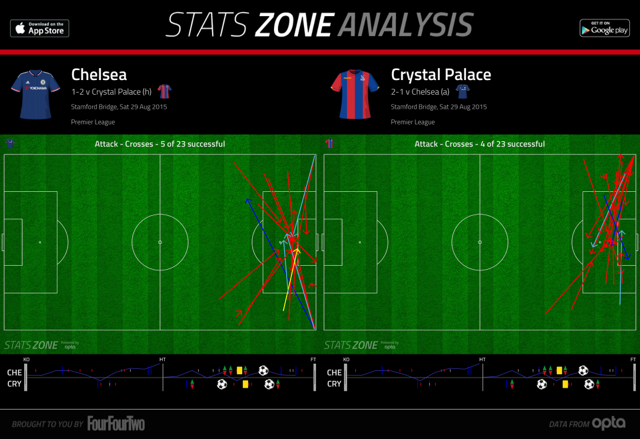
Generally, though, Palace sat deeper and let Chelsea's players – even Gary Cahill – take pot shots from distance, which in the first half especially, they did gladly... and badly.
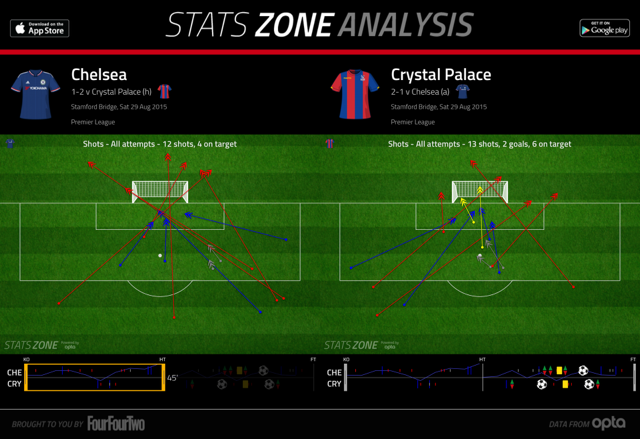
In fact, Palace were so content to let Chelsea have the ball that of the many times they won it from Mourinho's men, only once in the entire match did they win it in the hosts' half.
Get FourFourTwo Newsletter
The best features, fun and footballing quizzes, straight to your inbox every week.
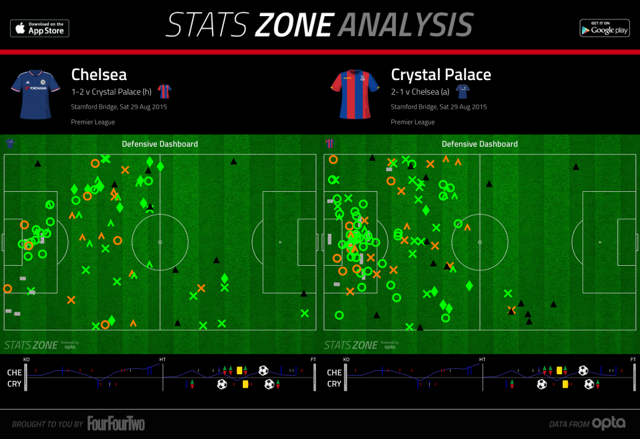
Just eight of the first 38 Premier League fixtures this season have ended in home wins. That's 21%, and given the average is usually around 45%, that is pretty extraordinary. The reason – as noted this week by the perspicacious Danny Higginbotham – is that more teams, from the top of the league to its murky depths, are embracing the counter-attack as a Plan A tactic. Alan Pardew's men executed it perfectly.
No wonder Mourinho was impressed.
2) Chelsea need to find a tactical middle ground
Mourinho himself was, not for the first time, caught between two stools: one labelled attack, the other defence. Pedro's arrival has lessened the creative burden on Eden Hazard already, but while Willian once again proved his worth as a hard-working scuttler, he still isn't creating enough opportunities: the Brazilian has contributed just six goals and five assists in 65 league games for the Blues. Fabregas has been inconsistent since his blistering, assist-laden start at Chelsea in the early weeks of last season, and offered very little going forward in this match.
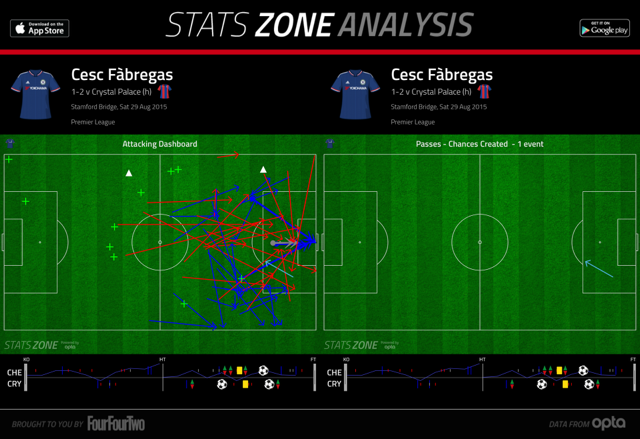
On this occasion, Chelsea lacked the attacking thrust to break Palace down. Usually Mourinho's Chelsea manage that well: the defensive unit works hard and there's no danger of defeat (hence his staggeringly good home record, this being only his second league defeat at Stamford Bridge in 100 matches). But when the Blues went behind to Bakary Sako's goal, Mourinho had to flip a switch – and flipped altogether.
Off went Willian and Cesar Azpilicueta; on came Radamel Falcao and Brazilian forward Kenedy for his debut – at left-back. Two defensively-minded players, replaced by two attackers. All of a sudden, Chelsea were briefly set up in a kind of 2-6-2 formation, with Gary Cahill and Kurt Zouma the only men defending.
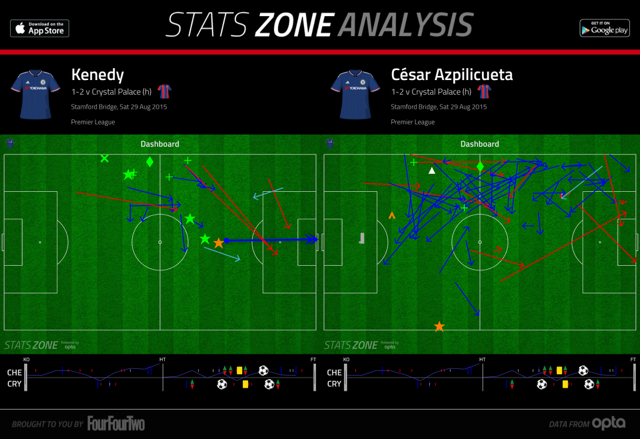
And in a way, it worked. Kenedy's first action was to surge forward and put in a dangerous cross, immediately offering a more direct threat than the nonetheless-reliable Azpilicueta had. Radamel Falcao scored with a well-placed header inside Alex McCarthy's near post (Pedro the provider). 1-1: job done.
But then, with Chelsea still top-heavy, Palace re-took the lead, having been given such attacking freedom that it was defender Joel Ward who guided a header into the bottom corner, after fine work from Sako and substitute Yannick Bolasie.
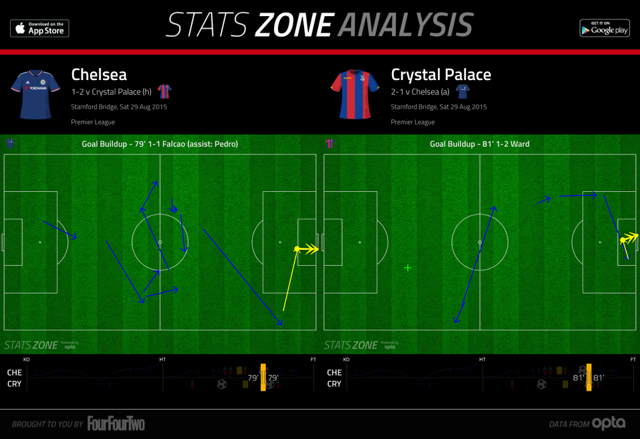
Once again Chelsea went into attacking overdrive, Kurt Zouma playing the role of targetman, but they couldn't destroy the Palace wall. So did Mourinho adapt wisely to the match situation? Or did he veer too suddenly from defence to attack? The latter looks a distinct possibility, even if, as Mourinho himself said, debutant and makeshift left-back Kenedy "was responsible for the improvement of the team and reaction after the first goal".
And while we're on the subject of Chelsea's full-backs...
3) Ivanovic's days really may be numbered
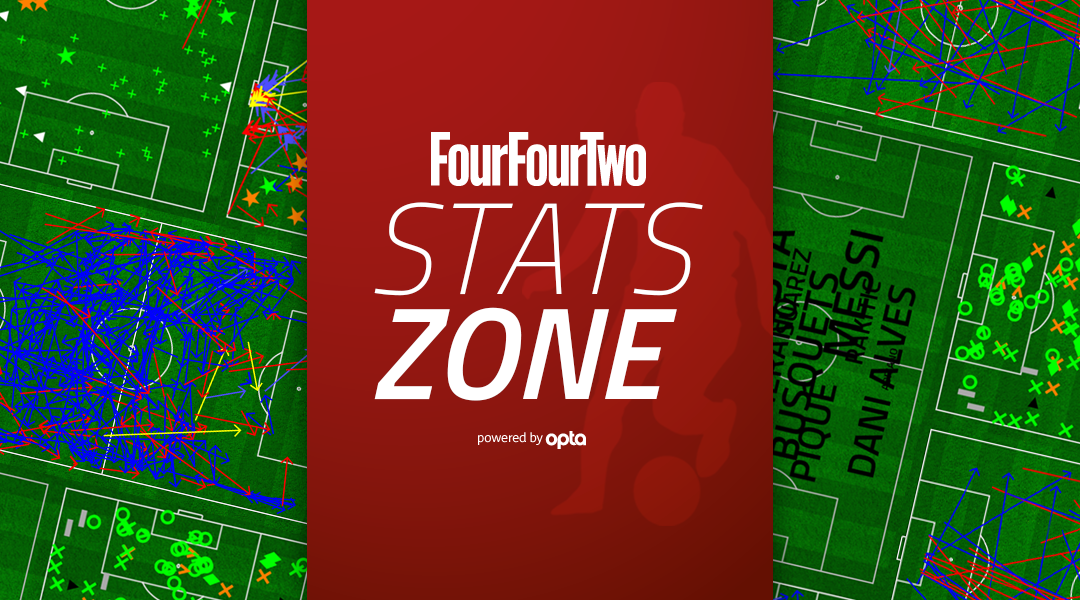
Baba Rahman was introduced to the Stamford Bridge crowd before kick-off but not entrusted with any playing time. That surely won't be the case for much longer.
After the defeat Mourinho lamented: "I cannot say I had 11 players performing. Two or three of them, their individual performance was far from good. I blame myself for not changing one of them, because I kept him in the game for 90 minutes. When I made the third change I realised I needed a fourth."
Mourinho wouldn't reveal who that person was – sensibly, it seems, until you realise that his anonymity attracted negative attention instead of deflecting it, as fans and journalists tried to deduce the player's identity – but it is thought he was talking about Branislav Ivanovic (though Fabregas and Hazard are also candidates).
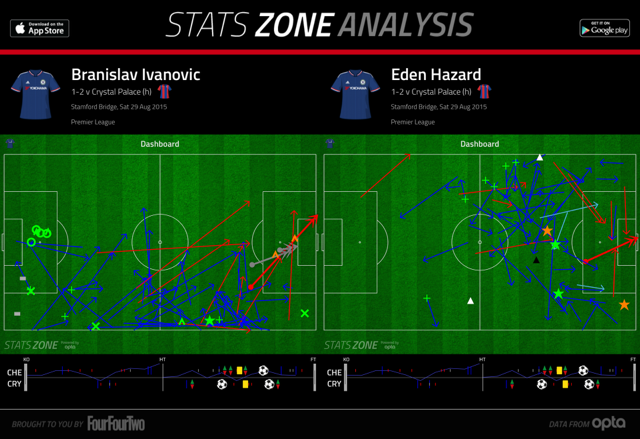
It became increasingly apparent over the course of last season and in the early stages of this one that 31-year-old Ivanovic has developed a bad habit common to many ageing full-backs, Patrice Evra among them: getting forward but not getting back. He showed it against Swansea and he showed it against Palace. And if there's one manager who won't continue to put up a lax attitude to defence – especially from a defender – it is Mourinho.
With Rahman signed to great intrigue and Azpilicueta more than ready to move back to his natural side, the Serb could be out of the team sooner than expected.
4) Chelsea are out of depth when out of their depth
One criticism that can be levelled at Jose Mourinho is his squad management. His charges always speak highly of their manager's man-management skills, and that certainly applies to the 14 or 15 players who make up the core of the squad. He likes working with a small unit, and has been successful. But over the past 18 months or so, Chelsea have let go of a number of useful squad players (albeit for a tidy total sum), from Kevin De Bruyne to the loaned-out Juan Cuadrado, via Andre Schurrle, Filipe Luis, Mohamed Salah and more.
The result is that they lack depth in the event of injuries, but more importantly, they lack alternatives when a game turns against them. Falcao scored as a substitute and 19-year-old Kenedy looked lively but Mourinho's other options – with no injury crisis to speak of – were limited to Ruben Loftus-Cheek (who replaced Nemanja Matic for the final 20 minutes), Rahman, Loic Remy and John Obi Mikel. It's not a bad bench, but it's not a title-winning one either. It could be argued that Crystal Palace had better options in reserve, not least as Bolasie came off the sidelines to create both goals.
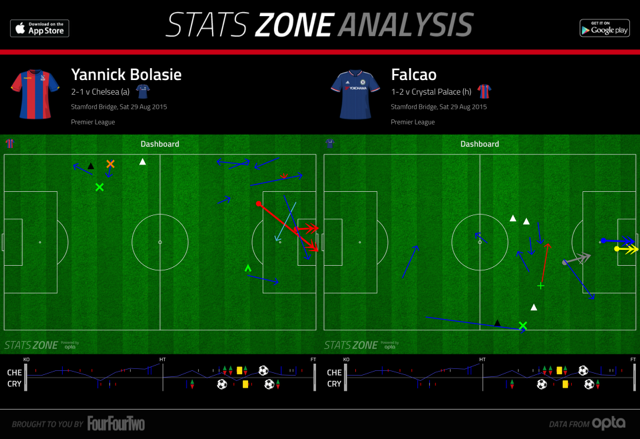
5) Palace can improve – in defence and attack
"This was the team's best performance that I've seen at Crystal Palace," said Pardew at the final whistle (before adding, wickedly, that Chelsea "played their part" and "were very resilient"). He's probably right. There's still room for improvement, though, and the match revealed two areas in particular that need work.
In the first half, although they made an impressive number of clearances and generally defended stoutly, the Palace defenders missed tackles in key areas. No doubt they feared giving away a penalty: they were, after all, playing away at a big club with a referee-baiting manager and a striker known for going down with relative ease (indeed, Diego Costa fell and appealed for a penalty in the first half but Craig Pawson wasn't interested).
However, a team cannot afford to repeatedly fail with attempted tackles in the penalty area. Even arch-destroyer Matic danced twinkle-toed through three defenders to get a shot on goal. That the visitors had only one penalty-box tackle to make in the second half reflects poorly on Chelsea.
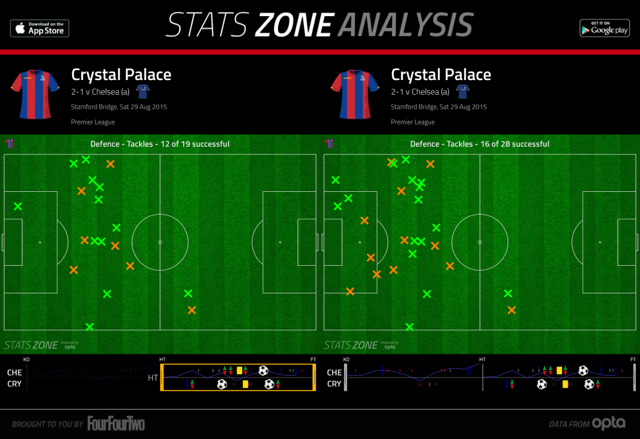
Secondly, Connor Wickham must offer more of an outlet when his new team-mates are under the cosh. Palace often sought their lone striker with a long pass to relieve pressure, but he won none of his first 6 aerial battles with Chelsea defenders and only 3 of his 13 in the match. The two teams actually attempted virtually the same number of long passes in the game; the fact that Chelsea's were twice as effective speaks volumes about Wickham's performance, as well as the aerial strength of their own centre-backs.
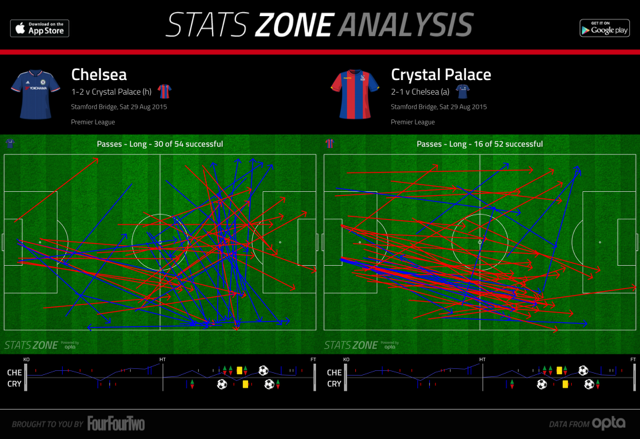
Wickham's build-up play was disappointing, too, and while he's usually a willing runner, he occasionally switched off; in fact, Jason Puncheon angrily remonstrated with him late in the game as a clearance to a Chelsea defender went unchallenged. Taking him off wasn't really an option, either: substitute Dwight Gayle would have offered pace on the counter but not the physical presence of Wickham (such as it was).
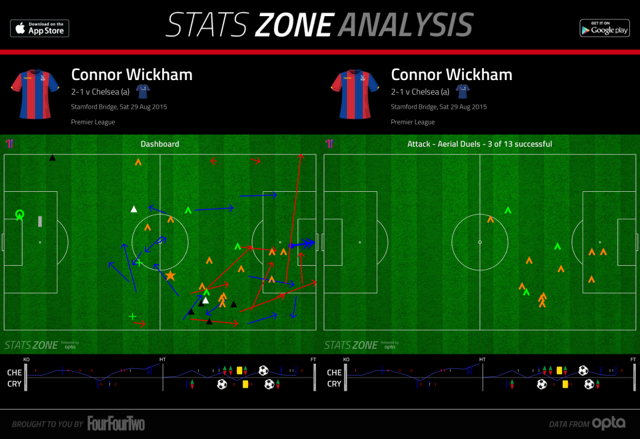
It wasn't all bad – for example, he put in one excellent low cross seemingly out of nothing – but Wickham will need to improve if he's to remain Pardew's first choice upfront.
More Premier League analysis like this on FFT.com
STATS ZONE Free on iOS • Free on Android
Huw was on the FourFourTwo staff from 2009 to 2015, ultimately as the magazine's Managing Editor, before becoming a freelancer and moving to Wales. As a writer, editor and tragic statto, he still contributes regularly to FFT in print and online, though as a match-going #WalesAway fan, he left a small chunk of his brain on one of many bus journeys across France in 2016.
